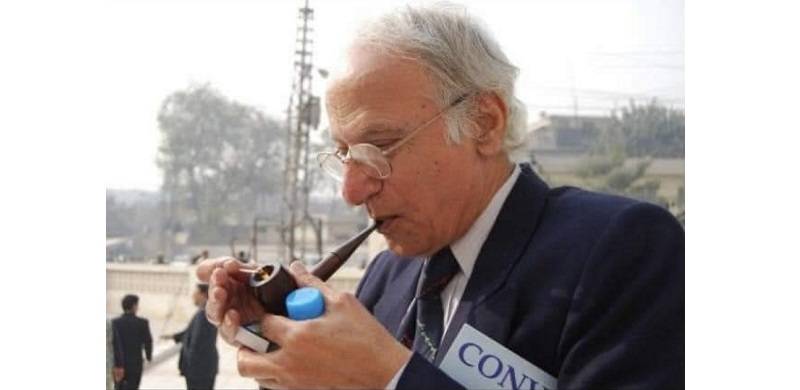
In Australia, amongst the indigenous aboriginal people, storylines or storytelling has been valued as the traditional ways of preserving culture, and is seen as a primary means to pass on knowledge over generations – becoming key in establishing the relationship of a people to culture, identity and land. Dr Mehdi Hasan, who passed away on the 22nd of February, was one of few remaining articulate, fearless, forthright Pakistani thinkers whose storylines persevered against the current trend of subsuming Pakistani culture into faux nationalism and religiosity. A renowned educationalist and commentator on media, his four books and his discourse (as preserved on YouTube) together with the knowledge passed onto thousands of his students, bear witness to his unwavering struggle and intellect.
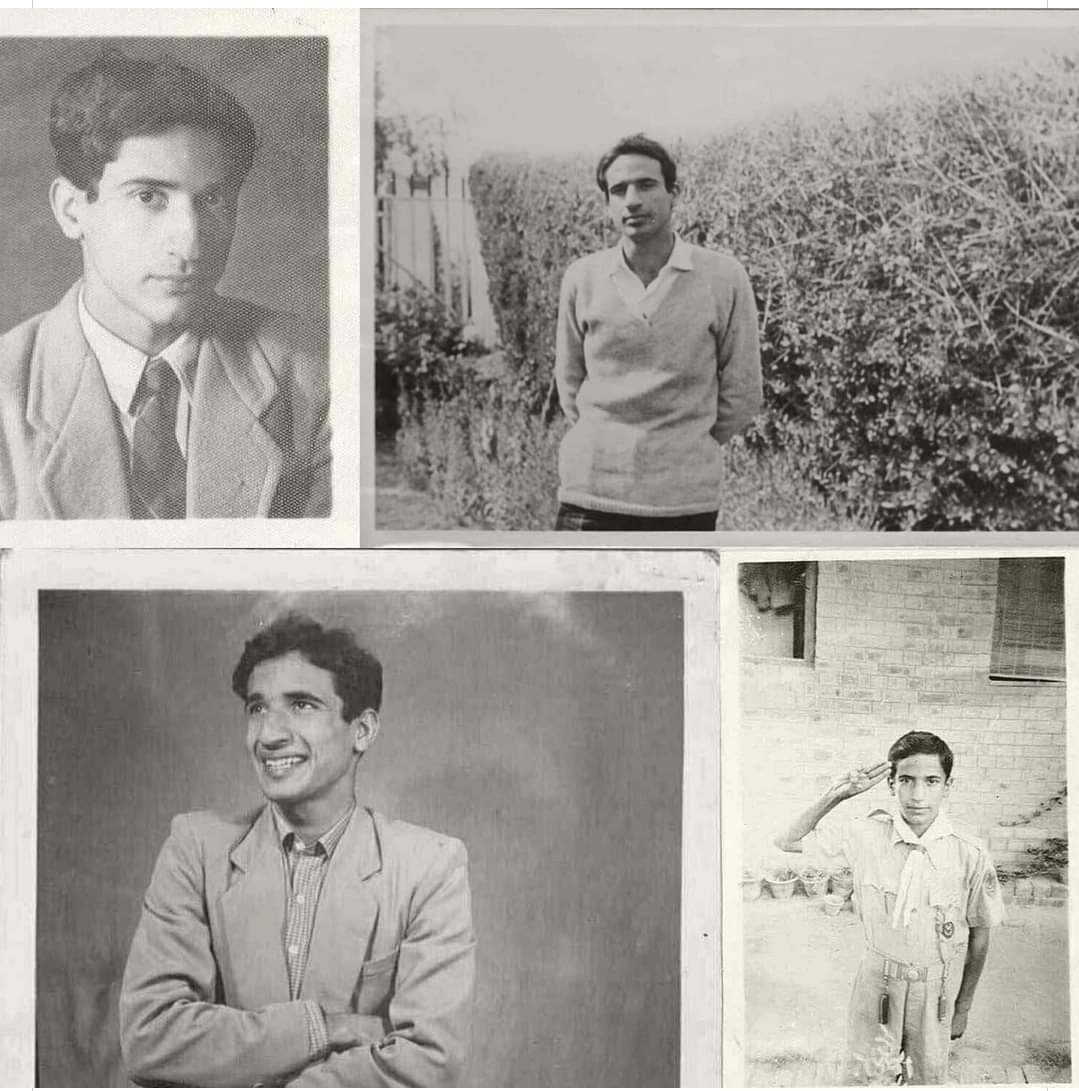 Dr Mehdi Hasan was born in June 1937 in Mohalla Ansaar in Panipat (now Haryana India). His family were known as the Hakeemwala part of the famous Khajgan-e-Panipat clan that traced its routes to Khwaja Abdullah Ansari, the Pir of Herat. His soulmate was his cousin Dr Mubashir Hasan. In November 1947 post-Partition, the family moved to Montgomery (now Sahiwal). The travails of the family during Partition are well documented in his brother Azhar Hasan’s book Yadgaar Shehr Marhoom (Memories of a Deceased City). His mother Amina Begum was a social activist who rose to become chairwoman of the PPP womens’ wing in Sahiwal. Her sartorial elegance has been documented in Fatma Shah’ article in this publication “Vestiges of steps taken.”
Dr Mehdi Hasan was born in June 1937 in Mohalla Ansaar in Panipat (now Haryana India). His family were known as the Hakeemwala part of the famous Khajgan-e-Panipat clan that traced its routes to Khwaja Abdullah Ansari, the Pir of Herat. His soulmate was his cousin Dr Mubashir Hasan. In November 1947 post-Partition, the family moved to Montgomery (now Sahiwal). The travails of the family during Partition are well documented in his brother Azhar Hasan’s book Yadgaar Shehr Marhoom (Memories of a Deceased City). His mother Amina Begum was a social activist who rose to become chairwoman of the PPP womens’ wing in Sahiwal. Her sartorial elegance has been documented in Fatma Shah’ article in this publication “Vestiges of steps taken.”
Born inquisitive and restless, Dr Mehdi Hasan was at educated Government College Montgomery (Sahiwal) where he completed in BA. However, he did not wish to pursue the professional career line as wished by his family. Instead he preferred seeking opportunities in Lahore, where he moved with his friend the TV compare Tariq Aziz. In 1961 he got a job as sub-editor at the now defunct PPI (Pakistan Press International) news agency, where he stayed till 1966. He and Tariq Aziz shared a rented room near Bhatti Gate, the struggles of which are wonderfully narrated by Tariq Aziz. During this time, working nights at PPI and attending college by day, he also completed his MA in journalism from Punjab University in 1964.
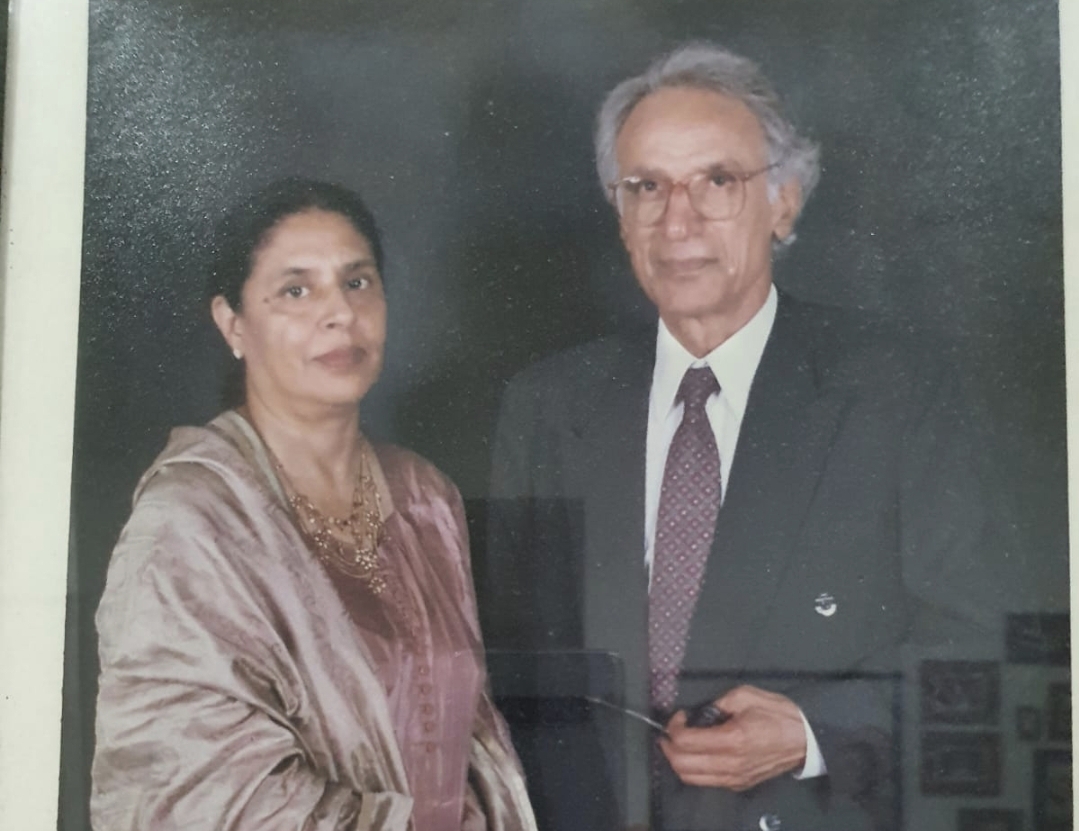
In 1962 he filed a satire article in which he made fun of the ruling elite ladies’ club. He was promptly arrested by governor Nawab of Kalabagh under section 16 of the MPO act, and sent to Sahiwal jail. In a couple of months, the charges were dropped and he was released. A keen photographer, Dr Mehdi actively reported from the front during the 1965 war, after which he together with Dr Mubashir and started a press agency called International News Service. Here he was reporting international news to local newspapers. However, due to a lack of interest that enterprise folded.
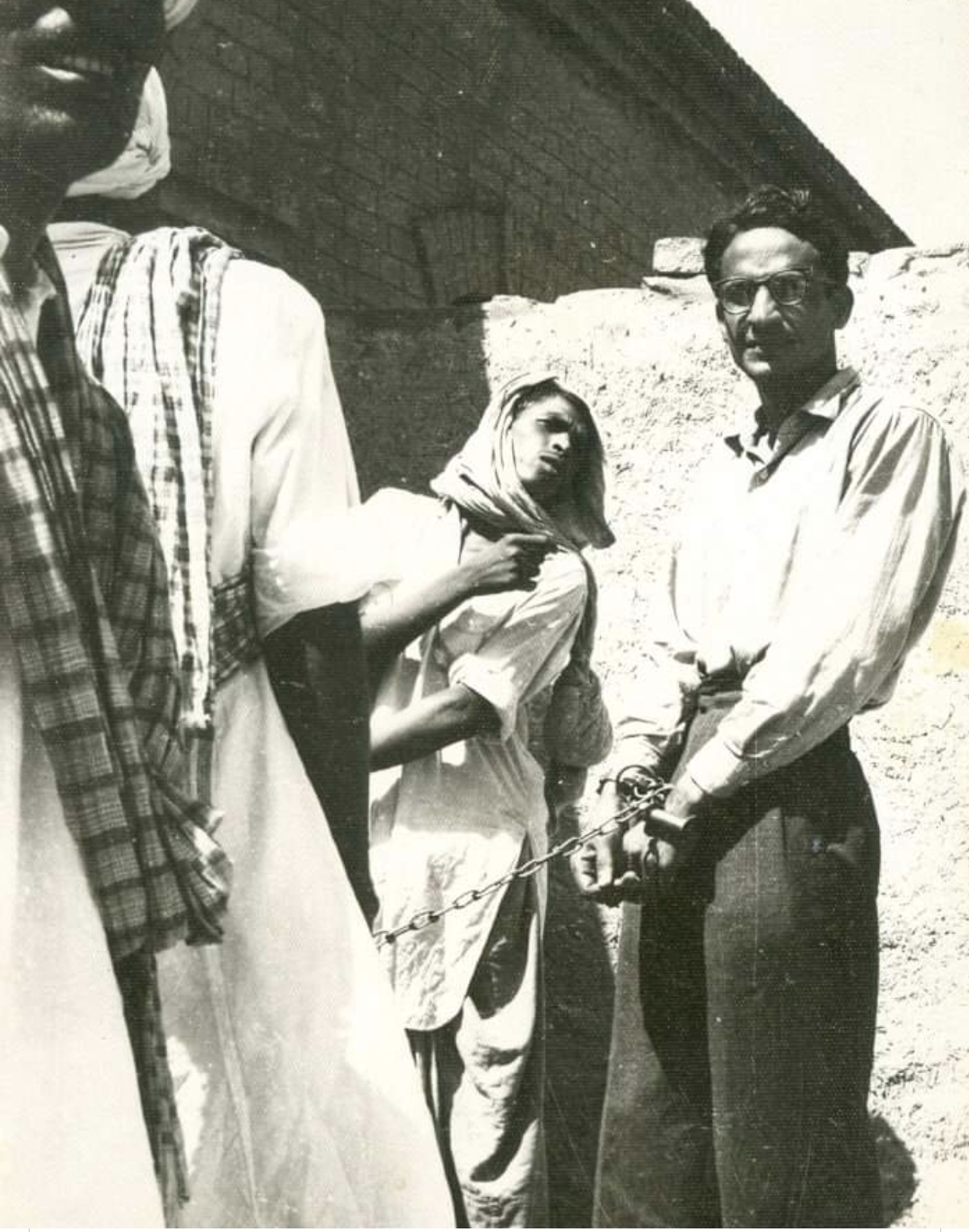 Dr Mehdi was a class fellow of Rakshanda Qureshi in journalism school. She had started working at Imroz straight after graduation and continued to work there for 30 years. Their head of department offered him the position of lecturer at the University, which he accepted in 1966. The two were married in 1967. Dr Mehdi remained at the university till his retirement as head of the department in 1998.
Dr Mehdi was a class fellow of Rakshanda Qureshi in journalism school. She had started working at Imroz straight after graduation and continued to work there for 30 years. Their head of department offered him the position of lecturer at the University, which he accepted in 1966. The two were married in 1967. Dr Mehdi remained at the university till his retirement as head of the department in 1998.
Throughout their 55 years of married life, Rakshanda remained the anchor of the family, not only contributing financially to the household in terms of running expenses, but also by providing much needed realism. In our family, even today, time-saving cooking techniques are known as “Rakshanda style cooking.” She would always readily serve food and tea to the numerous students and visitors to their house, whilst keeping tabs on the two boys and the dog. She would often begin cooking while the boys were having breakfast, to ensure sufficient time for the family to jointly watch the 8 pm PTV drama and 9 pm news.
The university administration did not treat Dr Mehdi, a progressive and leftist, kindly; particularly so during the Zia years. He remained a lecturer for 19 years, leading to his joke that he was Pakistan’s senior most lecturer. In the early 1980s, the vice chancellor called him to his office and said “Mehdi sahib, the problem is that the writ of the Government of Punjab extends only until the canal, beyond that, it is the writ of the Islami Jamiat Talaba (IJT) that governs – and they hate you. So, it would be best if you leave.” Dr Mehdi refused and continued to battle on.
Another time the Islamists put up posters in the University “Mehdi ko Hatao, Pakistan Bachao” (Remove Mehdi and save Pakistan). A bemused Dr Mehdi was not perturbed as much by the posters as by the question as to how would removing him from office save or sink the country.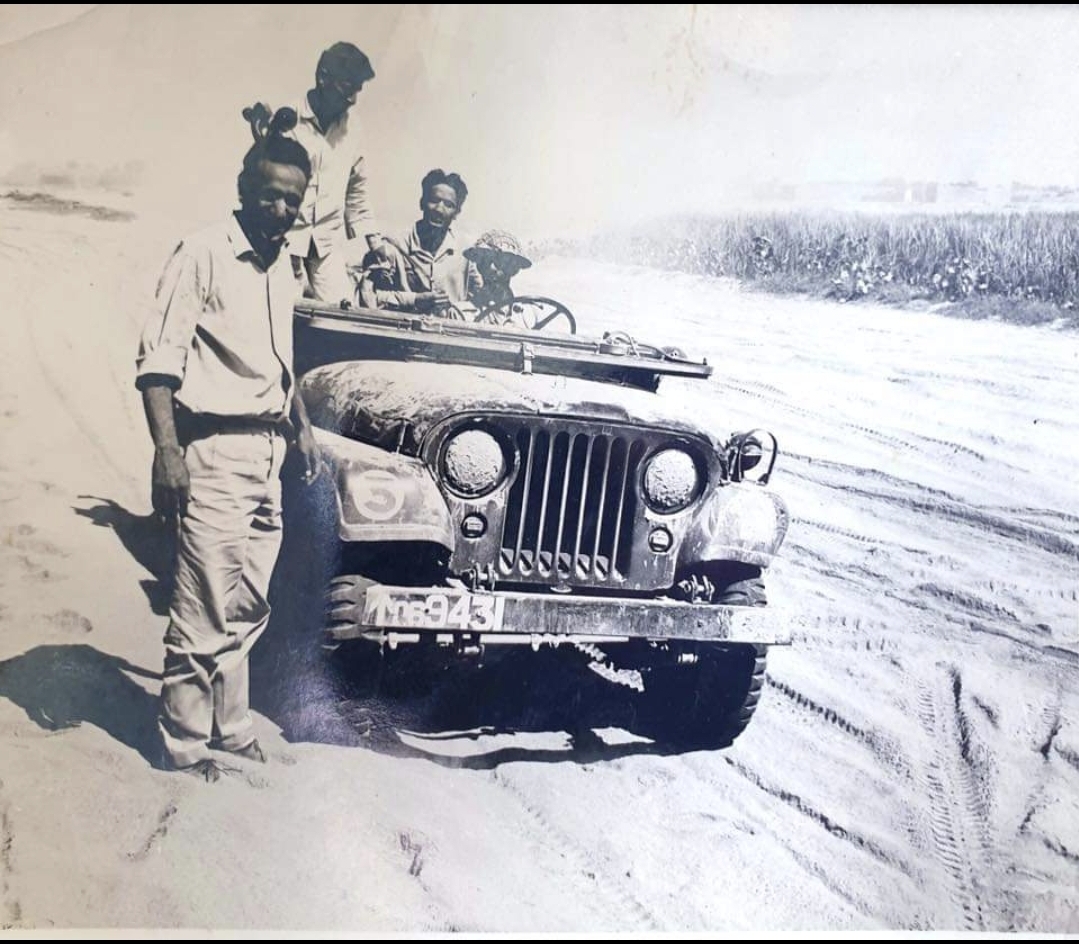
In yet another instance, a Jamiat student pulled a pistol on Dr Mehdi, who promptly advised his attackers to either shoot or put down the gun, as he wasn’t going to back down. Fortunately, the attacker put his gun down.
Once a sticker with Islamic verses was stuck on his office door (implying that he was a non-believer). Dr Mehdi summoned the administration and refused to enter his office unless they were removed. But removing them would be tantamount to ‘blasphemy’ for those who had put them on. Eventually, a solution was found whereby the entire door was repainted.
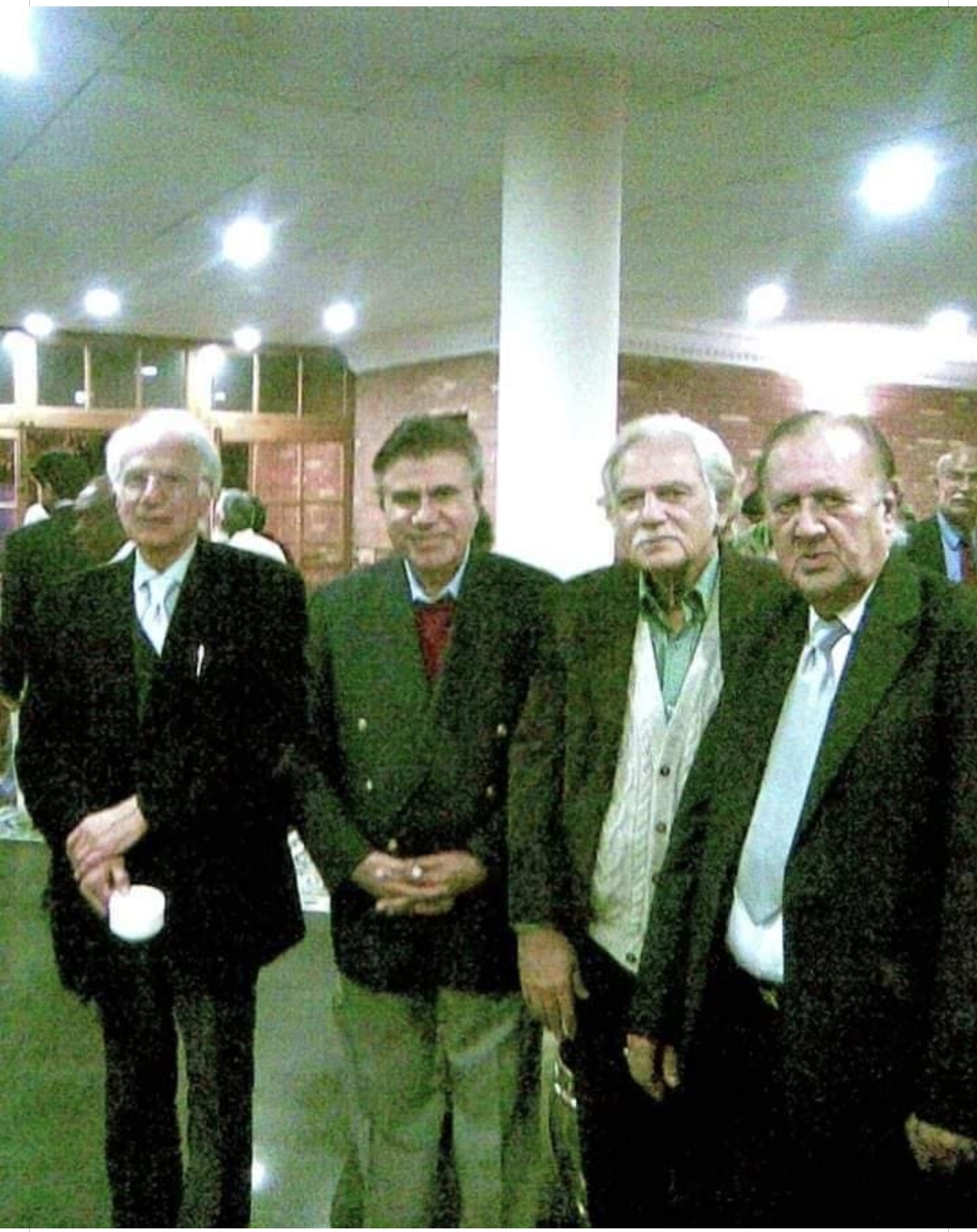 In 1983, students protesting for the MRD movement were killed in Nawabshah. Dr Mehdi organised a signature campaign condemning this brutality. This was seen as a political act and a show-cause notice to terminate his employment was submitted. He took a court injunction when the stay came up for confirmation hearing at the Lahore High Court. The judge Justice Mujadid Mirza asked where his lawyer was. He informed the court that his lawyer Raza Kazim had been arrested by General Zia-ul-Haq’s regime and sent to Attock Fort. Upon hearing this, the judge asked him to argue the case himself. “Why don’t you go into politics?” the judge asked. “I am not in politics, but it is my duty as a teacher to awaken the political awareness in my students,” he replied. The stay order was confirmed and continued until the end of his tenure in 1998. Upon retirement he joined Beaconhouse National University (BNU) as head of department for Mass Communication.
In 1983, students protesting for the MRD movement were killed in Nawabshah. Dr Mehdi organised a signature campaign condemning this brutality. This was seen as a political act and a show-cause notice to terminate his employment was submitted. He took a court injunction when the stay came up for confirmation hearing at the Lahore High Court. The judge Justice Mujadid Mirza asked where his lawyer was. He informed the court that his lawyer Raza Kazim had been arrested by General Zia-ul-Haq’s regime and sent to Attock Fort. Upon hearing this, the judge asked him to argue the case himself. “Why don’t you go into politics?” the judge asked. “I am not in politics, but it is my duty as a teacher to awaken the political awareness in my students,” he replied. The stay order was confirmed and continued until the end of his tenure in 1998. Upon retirement he joined Beaconhouse National University (BNU) as head of department for Mass Communication.
In 1984 we was awarded a PhD: even that was struggle as there was no PhD in journalism in the whole department who could review his thesis. Eventually the vice chancellor appointed a PhD from another department to review and approve Dr Mehdi’s doctorate dissertation.
Fortunately, life improved for Dr Mehdi after the Zia days. He was respected as an intellectual and was invited to give external lectures, and after 2001, to appear on television. As a professor of communication, his thesis was straightforward: namely that knowledge is experiential, and influenced by what a person has read, seen, heard or experienced in their own life. Accordingly, every individual’s own understanding, including that of religion and nationalism, is different. And so, he argued, it must be respected. It is not possible to shoehorn everyone into the same mould: humans need space. In his view, trying to paper over the differences, often through violence, will lead to a dysfunctional society.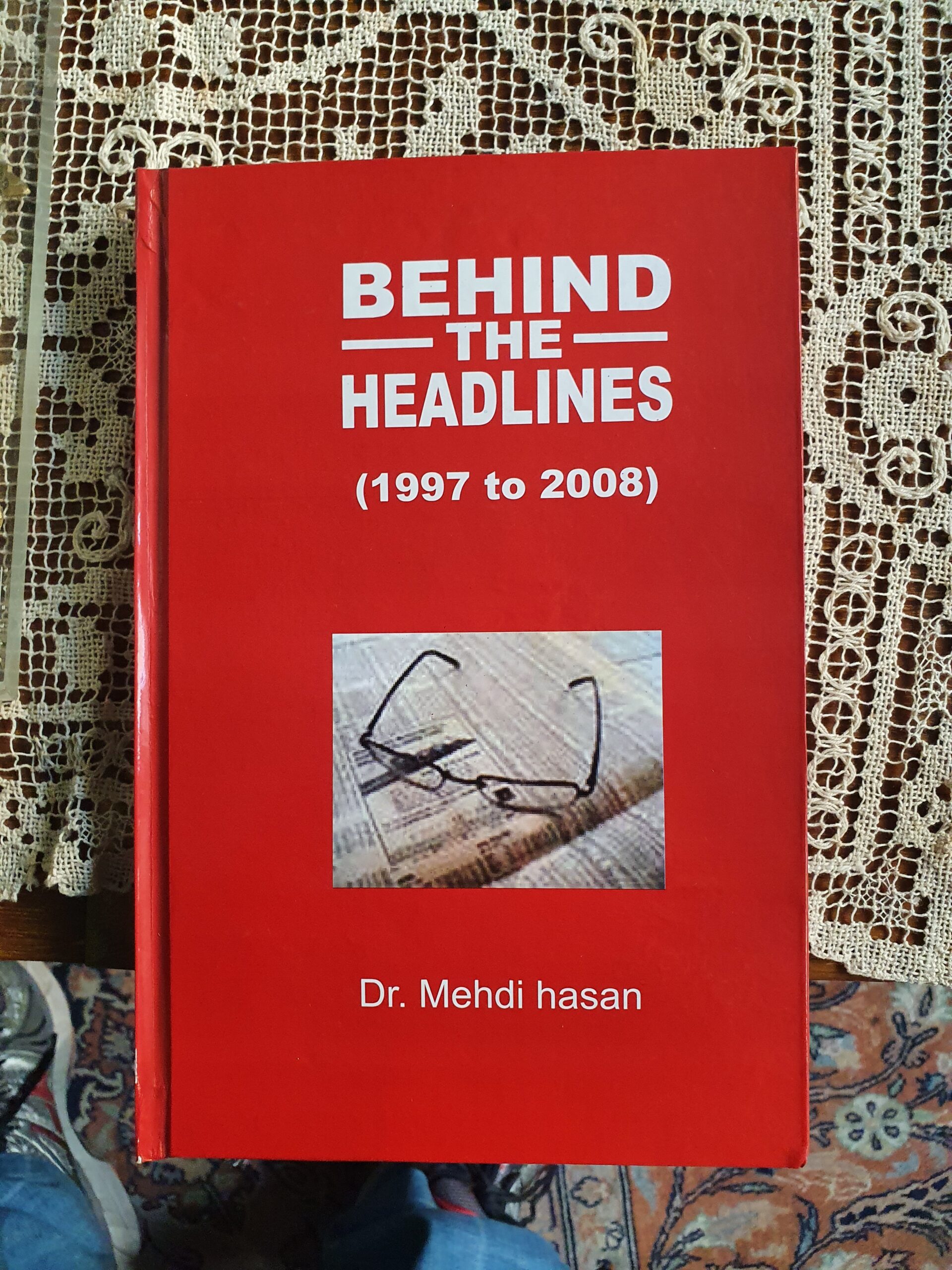
His numerous debates on YouTube accentuate his enlightened views. He would quote from the Quran, especially the verse that says, “There is no compulsion in religion.” Similarly, he would quote from the Quran to point out that there was no priesthood in Islam. “You do not need a priest - to lead the prayers, solemnise a marriage, or wash the dead and prepare them for burial,” he would tell us.
About nationalism, he would point out that it must be distinguished from militancy or supporting war. In his view, the proliferation of military hardware on the streets in the form of planes or tanks on streets or playgrounds glorifies war and militancy, whereas what will actually lead this country out of poverty is emphasis on education, culture, science, technology and commerce. Just because someone disagrees with the current narrative of the state does not mean that they are friends of external powers, etc.
He was five times elected to posts for the Pakistan Federal Union of Journalists (PFUJ). He was also a member of PEMRA, the electronic media regulatory body. Always a great believer in journalistic accuracy, on one occasion he asked an owner of a TV channel if they had a gatekeeper - meaning someone to ascertain the veracity of the news. “Yes, Dr Sahib, we have a retired subedar who sits on the door and is our gatekeeper,” came the reply.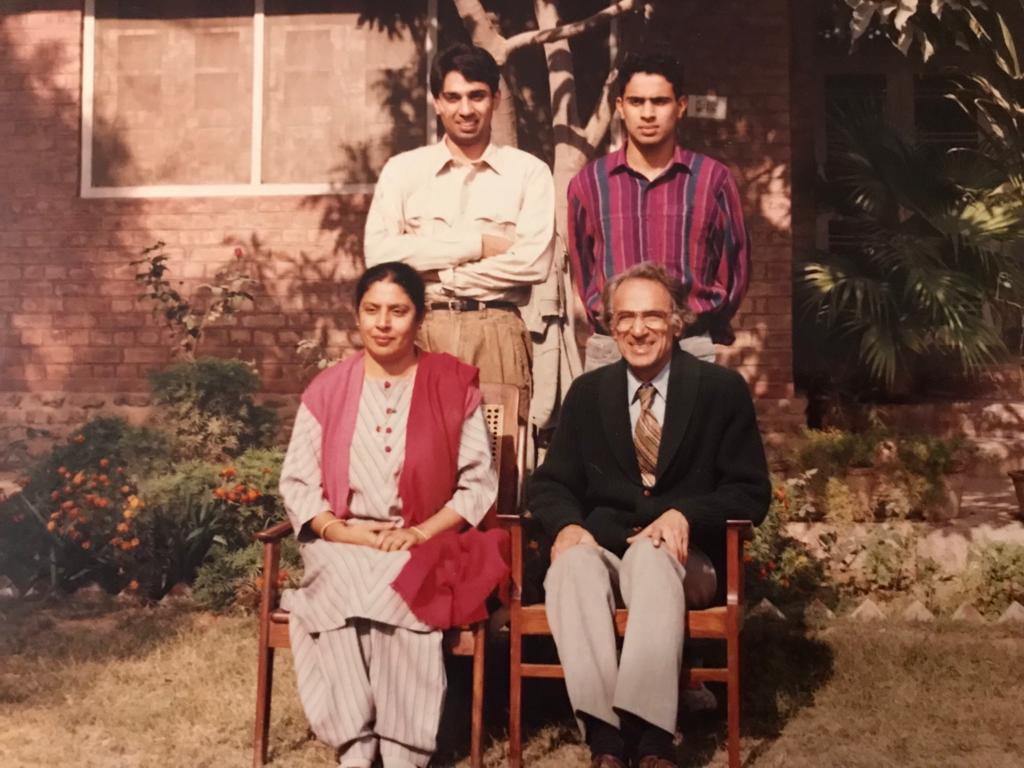
Dr Mehdi tried giving advice to the rulers – but with limited success. He recalls a dinner with then Prime Minster Benazir Bhutto, when he asked her for a few minutes to give her some advice. “Yes, how can I help you, Dr Sahib?” Benazir replied. Dr Mehdi reiterated that he did not want anything other than to give advice. “Oh Dr Sahib let’s have some khana (food),” was her reply. Amusingly, exactly the same thing happened with President Pervaiz Musharraf, who invited him over lunch to talk about “enlightened moderation.” When Dr Mehdi started telling him some home truths, the President replied, “Come on Dr Sahib, let’s eat.”
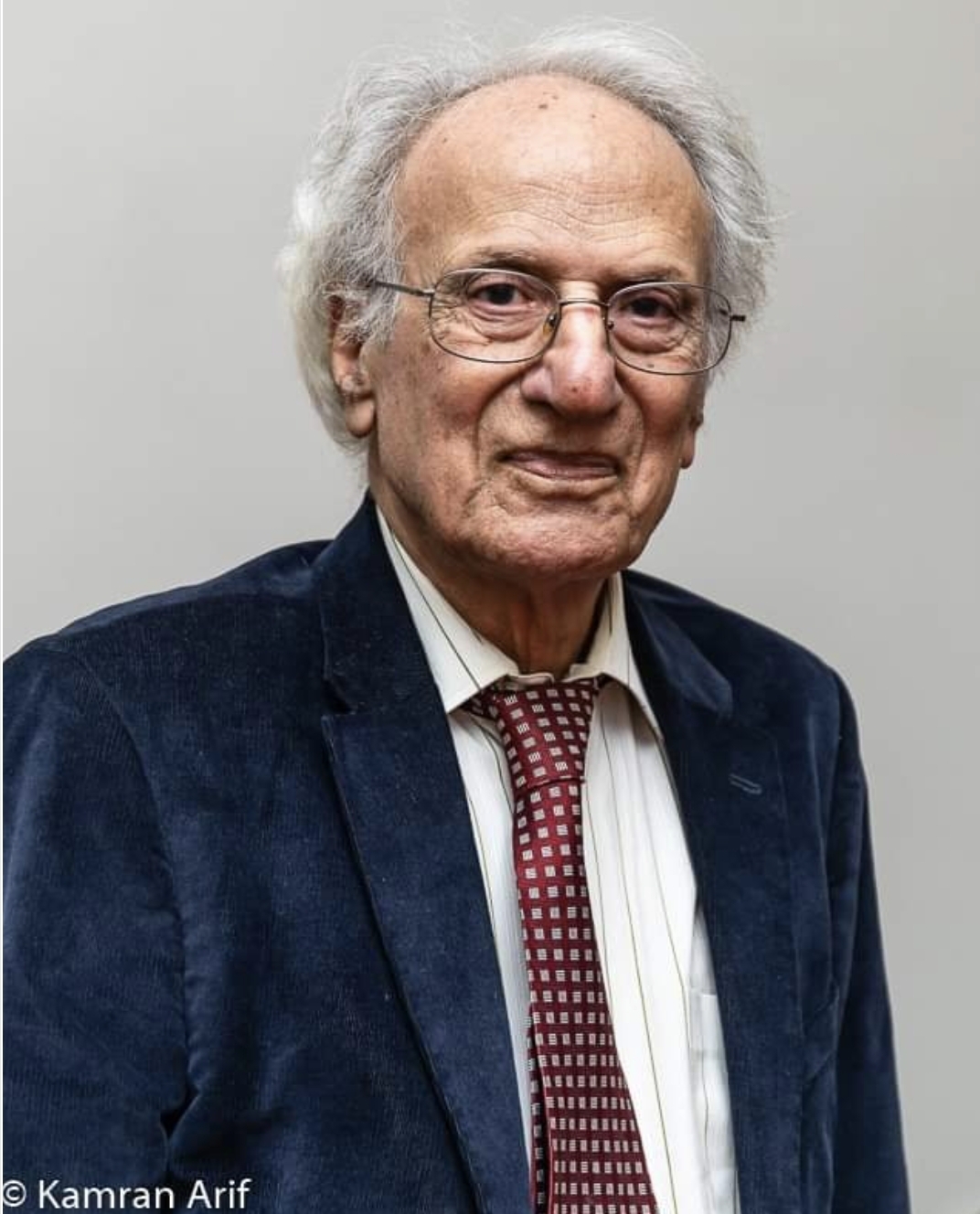 He was a founding member of Human Rights Commission of Pakistan (HRCP) and eventually became its chairman. He was also a founding member of the People’s Forum for Peace and Democracy. He was awarded Sitara-i-Imtiaz for his services to Pakistan. His books including The Political History of Pakistan and Journalism for All (currently in its 9th edition) still serve as the main reference texts for journalism courses in Pakistan.
He was a founding member of Human Rights Commission of Pakistan (HRCP) and eventually became its chairman. He was also a founding member of the People’s Forum for Peace and Democracy. He was awarded Sitara-i-Imtiaz for his services to Pakistan. His books including The Political History of Pakistan and Journalism for All (currently in its 9th edition) still serve as the main reference texts for journalism courses in Pakistan.
No mention of Dr Mehdi is complete without speaking of his love for the outdoors. Until about ten years ago, there were at least two annual trips with the family. In the summers it would be in the mountains of Naran, Gilgit Hunza or even the Punjab University lodges in Khanaspur near Nathiagali. And winters would be spent either camping on the river at Tirimmu barrage, Cholistan or the Salt Range. During those trips, Dr Mehdi took it upon himself to the cook for the entire tribe, often cooking for up to twenty persons. He was given the moniker Sir Thomas Cook.
One of Dr Mehdi’s favourite books was Quarrat-ul-Ain Haider’s Aag ka Darya, which chronicles travails of India through a “river of fire.” Dr Mehdi Hasan’s own journey through fire has come to an end. But as we experience the shrill sounds of an intensely partisan media, one wonders – as do many of his students and admirers – if there is still anyone still left to shine the torch of enlightenment, to secure our culture, to lead us out of this quicksand of false religiosity and nationalism.
 Dr Mehdi Hasan was born in June 1937 in Mohalla Ansaar in Panipat (now Haryana India). His family were known as the Hakeemwala part of the famous Khajgan-e-Panipat clan that traced its routes to Khwaja Abdullah Ansari, the Pir of Herat. His soulmate was his cousin Dr Mubashir Hasan. In November 1947 post-Partition, the family moved to Montgomery (now Sahiwal). The travails of the family during Partition are well documented in his brother Azhar Hasan’s book Yadgaar Shehr Marhoom (Memories of a Deceased City). His mother Amina Begum was a social activist who rose to become chairwoman of the PPP womens’ wing in Sahiwal. Her sartorial elegance has been documented in Fatma Shah’ article in this publication “Vestiges of steps taken.”
Dr Mehdi Hasan was born in June 1937 in Mohalla Ansaar in Panipat (now Haryana India). His family were known as the Hakeemwala part of the famous Khajgan-e-Panipat clan that traced its routes to Khwaja Abdullah Ansari, the Pir of Herat. His soulmate was his cousin Dr Mubashir Hasan. In November 1947 post-Partition, the family moved to Montgomery (now Sahiwal). The travails of the family during Partition are well documented in his brother Azhar Hasan’s book Yadgaar Shehr Marhoom (Memories of a Deceased City). His mother Amina Begum was a social activist who rose to become chairwoman of the PPP womens’ wing in Sahiwal. Her sartorial elegance has been documented in Fatma Shah’ article in this publication “Vestiges of steps taken.”Born inquisitive and restless, Dr Mehdi Hasan was at educated Government College Montgomery (Sahiwal) where he completed in BA. However, he did not wish to pursue the professional career line as wished by his family. Instead he preferred seeking opportunities in Lahore, where he moved with his friend the TV compare Tariq Aziz. In 1961 he got a job as sub-editor at the now defunct PPI (Pakistan Press International) news agency, where he stayed till 1966. He and Tariq Aziz shared a rented room near Bhatti Gate, the struggles of which are wonderfully narrated by Tariq Aziz. During this time, working nights at PPI and attending college by day, he also completed his MA in journalism from Punjab University in 1964.
In yet another instance, a Jamiat student pulled a pistol on Dr Mehdi, who promptly advised his attackers to either shoot or put down the gun, as he wasn’t going to back down. Fortunately, the attacker put his gun down

In 1962 he filed a satire article in which he made fun of the ruling elite ladies’ club. He was promptly arrested by governor Nawab of Kalabagh under section 16 of the MPO act, and sent to Sahiwal jail. In a couple of months, the charges were dropped and he was released. A keen photographer, Dr Mehdi actively reported from the front during the 1965 war, after which he together with Dr Mubashir and started a press agency called International News Service. Here he was reporting international news to local newspapers. However, due to a lack of interest that enterprise folded.
 Dr Mehdi was a class fellow of Rakshanda Qureshi in journalism school. She had started working at Imroz straight after graduation and continued to work there for 30 years. Their head of department offered him the position of lecturer at the University, which he accepted in 1966. The two were married in 1967. Dr Mehdi remained at the university till his retirement as head of the department in 1998.
Dr Mehdi was a class fellow of Rakshanda Qureshi in journalism school. She had started working at Imroz straight after graduation and continued to work there for 30 years. Their head of department offered him the position of lecturer at the University, which he accepted in 1966. The two were married in 1967. Dr Mehdi remained at the university till his retirement as head of the department in 1998.Throughout their 55 years of married life, Rakshanda remained the anchor of the family, not only contributing financially to the household in terms of running expenses, but also by providing much needed realism. In our family, even today, time-saving cooking techniques are known as “Rakshanda style cooking.” She would always readily serve food and tea to the numerous students and visitors to their house, whilst keeping tabs on the two boys and the dog. She would often begin cooking while the boys were having breakfast, to ensure sufficient time for the family to jointly watch the 8 pm PTV drama and 9 pm news.
The university administration did not treat Dr Mehdi, a progressive and leftist, kindly; particularly so during the Zia years. He remained a lecturer for 19 years, leading to his joke that he was Pakistan’s senior most lecturer. In the early 1980s, the vice chancellor called him to his office and said “Mehdi sahib, the problem is that the writ of the Government of Punjab extends only until the canal, beyond that, it is the writ of the Islami Jamiat Talaba (IJT) that governs – and they hate you. So, it would be best if you leave.” Dr Mehdi refused and continued to battle on.
Another time the Islamists put up posters in the University “Mehdi ko Hatao, Pakistan Bachao” (Remove Mehdi and save Pakistan). A bemused Dr Mehdi was not perturbed as much by the posters as by the question as to how would removing him from office save or sink the country.

In yet another instance, a Jamiat student pulled a pistol on Dr Mehdi, who promptly advised his attackers to either shoot or put down the gun, as he wasn’t going to back down. Fortunately, the attacker put his gun down.
Once a sticker with Islamic verses was stuck on his office door (implying that he was a non-believer). Dr Mehdi summoned the administration and refused to enter his office unless they were removed. But removing them would be tantamount to ‘blasphemy’ for those who had put them on. Eventually, a solution was found whereby the entire door was repainted.
 In 1983, students protesting for the MRD movement were killed in Nawabshah. Dr Mehdi organised a signature campaign condemning this brutality. This was seen as a political act and a show-cause notice to terminate his employment was submitted. He took a court injunction when the stay came up for confirmation hearing at the Lahore High Court. The judge Justice Mujadid Mirza asked where his lawyer was. He informed the court that his lawyer Raza Kazim had been arrested by General Zia-ul-Haq’s regime and sent to Attock Fort. Upon hearing this, the judge asked him to argue the case himself. “Why don’t you go into politics?” the judge asked. “I am not in politics, but it is my duty as a teacher to awaken the political awareness in my students,” he replied. The stay order was confirmed and continued until the end of his tenure in 1998. Upon retirement he joined Beaconhouse National University (BNU) as head of department for Mass Communication.
In 1983, students protesting for the MRD movement were killed in Nawabshah. Dr Mehdi organised a signature campaign condemning this brutality. This was seen as a political act and a show-cause notice to terminate his employment was submitted. He took a court injunction when the stay came up for confirmation hearing at the Lahore High Court. The judge Justice Mujadid Mirza asked where his lawyer was. He informed the court that his lawyer Raza Kazim had been arrested by General Zia-ul-Haq’s regime and sent to Attock Fort. Upon hearing this, the judge asked him to argue the case himself. “Why don’t you go into politics?” the judge asked. “I am not in politics, but it is my duty as a teacher to awaken the political awareness in my students,” he replied. The stay order was confirmed and continued until the end of his tenure in 1998. Upon retirement he joined Beaconhouse National University (BNU) as head of department for Mass Communication.In 1984 we was awarded a PhD: even that was struggle as there was no PhD in journalism in the whole department who could review his thesis. Eventually the vice chancellor appointed a PhD from another department to review and approve Dr Mehdi’s doctorate dissertation.
Fortunately, life improved for Dr Mehdi after the Zia days. He was respected as an intellectual and was invited to give external lectures, and after 2001, to appear on television. As a professor of communication, his thesis was straightforward: namely that knowledge is experiential, and influenced by what a person has read, seen, heard or experienced in their own life. Accordingly, every individual’s own understanding, including that of religion and nationalism, is different. And so, he argued, it must be respected. It is not possible to shoehorn everyone into the same mould: humans need space. In his view, trying to paper over the differences, often through violence, will lead to a dysfunctional society.

His numerous debates on YouTube accentuate his enlightened views. He would quote from the Quran, especially the verse that says, “There is no compulsion in religion.” Similarly, he would quote from the Quran to point out that there was no priesthood in Islam. “You do not need a priest - to lead the prayers, solemnise a marriage, or wash the dead and prepare them for burial,” he would tell us.
About nationalism, he would point out that it must be distinguished from militancy or supporting war. In his view, the proliferation of military hardware on the streets in the form of planes or tanks on streets or playgrounds glorifies war and militancy, whereas what will actually lead this country out of poverty is emphasis on education, culture, science, technology and commerce. Just because someone disagrees with the current narrative of the state does not mean that they are friends of external powers, etc.
He was five times elected to posts for the Pakistan Federal Union of Journalists (PFUJ). He was also a member of PEMRA, the electronic media regulatory body. Always a great believer in journalistic accuracy, on one occasion he asked an owner of a TV channel if they had a gatekeeper - meaning someone to ascertain the veracity of the news. “Yes, Dr Sahib, we have a retired subedar who sits on the door and is our gatekeeper,” came the reply.

Dr Mehdi tried giving advice to the rulers – but with limited success. He recalls a dinner with then Prime Minster Benazir Bhutto, when he asked her for a few minutes to give her some advice. “Yes, how can I help you, Dr Sahib?” Benazir replied. Dr Mehdi reiterated that he did not want anything other than to give advice. “Oh Dr Sahib let’s have some khana (food),” was her reply. Amusingly, exactly the same thing happened with President Pervaiz Musharraf, who invited him over lunch to talk about “enlightened moderation.” When Dr Mehdi started telling him some home truths, the President replied, “Come on Dr Sahib, let’s eat.”
 He was a founding member of Human Rights Commission of Pakistan (HRCP) and eventually became its chairman. He was also a founding member of the People’s Forum for Peace and Democracy. He was awarded Sitara-i-Imtiaz for his services to Pakistan. His books including The Political History of Pakistan and Journalism for All (currently in its 9th edition) still serve as the main reference texts for journalism courses in Pakistan.
He was a founding member of Human Rights Commission of Pakistan (HRCP) and eventually became its chairman. He was also a founding member of the People’s Forum for Peace and Democracy. He was awarded Sitara-i-Imtiaz for his services to Pakistan. His books including The Political History of Pakistan and Journalism for All (currently in its 9th edition) still serve as the main reference texts for journalism courses in Pakistan.No mention of Dr Mehdi is complete without speaking of his love for the outdoors. Until about ten years ago, there were at least two annual trips with the family. In the summers it would be in the mountains of Naran, Gilgit Hunza or even the Punjab University lodges in Khanaspur near Nathiagali. And winters would be spent either camping on the river at Tirimmu barrage, Cholistan or the Salt Range. During those trips, Dr Mehdi took it upon himself to the cook for the entire tribe, often cooking for up to twenty persons. He was given the moniker Sir Thomas Cook.
One of Dr Mehdi’s favourite books was Quarrat-ul-Ain Haider’s Aag ka Darya, which chronicles travails of India through a “river of fire.” Dr Mehdi Hasan’s own journey through fire has come to an end. But as we experience the shrill sounds of an intensely partisan media, one wonders – as do many of his students and admirers – if there is still anyone still left to shine the torch of enlightenment, to secure our culture, to lead us out of this quicksand of false religiosity and nationalism.

